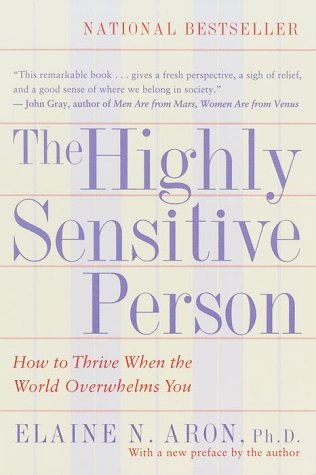Home should be happy,
Not melancholy or sad
This is the SAD life.
Way too much pasta,
bread and yummy oreos
Are in my belly.
Romance: no such thing.
Gathering thoughts and courage
For another day.
Home should be happy,
Not melancholy or sad
This is the SAD life.
Way too much pasta,
bread and yummy oreos
Are in my belly.
Romance: no such thing.
Gathering thoughts and courage
For another day.

It is important not to confuse arousal with fear. Fear creates arousal, but so do many other emotions, including joy, curiously, or anger. (p.9)
Some HSPs, perhaps all of us at times, get sidelined because of thinking that there is no way an HSP can be out in the world and survive. One feels too different, too vulnerable, perhaps too flawed... (p. 49)
Our culture has an idea of competition in the pursuit of excellence that can make anyone not striving for the top feel like a worthless, nonproductive bystander. This applies not only to one's career but even to one's leisure. Are you fit enough, are you progressing in your hobby, are you competent as a cook or gardener?... There is one other reason HSPs drive their bodies too hard, and that is their intuition, which gives some of then a steady stream of creative ideas. They want to express them all. (p. 52-53)
An expanded, loving mind, one that is open to the whole universe, is the opposite of a tightly constricted, overaroused mind. (p. 58)
Introversion arises from a need and preference to protect the inner, "subjective" aspect of life, to value it more, and in particular not to allow it to be overwhelmed by the "objective" world. (p. 99)She goes on to quote Carl Jung:
They [introverts] are living evidence that this rich and varied world with its overflowing and intoxicating life is not purely external, but also exists within...Their life teaches more than their words...Their lives teach the other possibility, the interior life which is so painfully wanting in our civilization.
...it can feel wonderful to stay home once you accept that home is truly where you sometimes belong (p. 154)
You can tolerate high levels of stimulation, especially when you are with someone who relaxes you and makes you feel safe. (p. 155)
Because HSPs have such close contact with the unconscious, such vivid dreams, and such an intense pull toward the imaginal and spiritual, we cannot flourish until we are experts on this facet of ourselves. (p. 184)The book goes on to provide tips on how others can deal with working with, raising, or dating an HSP. Elaine estimates that only about 15-20% of the population could be characterized as being highly sensitive. She says that's not enough to be widely understood but too many to be called a disorder. (Thanks, Elaine.)
...First and most important we must find the key to peace and good will on Earth... Man has always wanted peace. In order to find the peace that man desires there has nearly always had to be a war...
...we cannot hope to achieve peace and good will by some physical or earthly means of preservation. Where can we now turn? Since there is no solution here on Earth, we must look to someone who we have left out for a long time. We must stop depending on ourselves and our fellow men. We must go back and humble ourselves...
...we must go through a spiritual revival ourselves. America is lucky to have survived as long as we have. We have strayed very far...